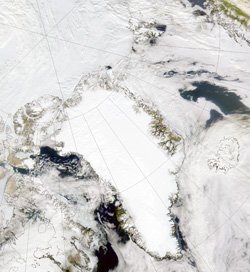
A view of Greenland and its ice sheet from space. If the ice sheet melted, global sea levels would rise an estimated 7 meters (23 feet).
Greenland ice sheets melting: Global warming advances faster than anticipated
As the world digests the flow on from rising petrol prices, the implications of its increased use are also being debated. A new study published in the journal Science reveals that global warming is melting Greenland's ice sheet three times faster than scientists had thought.
Accererating melt
By 2020, the snows of Kilimanjaro may exist only in old photographs. The glaciers in Montana's Glacier National Park could disappear by 2030. And by mid-century, the Arctic Sea may be completely ice-free during summertime. As the earth's temperature has risen in recent decades, the earth's ice cover has begun to melt. And that melting is accelerating.
Sea Levels Likely To Rise Much Faster Than Was Predicted
Global warming is causing the Greenland ice cap to disintegrate far faster than anyone predicted. A study of the region's massive ice sheet warns that sea levels may - as a consequence - rise more dramatically than expected.
Scientists have found that many of the huge glaciers of Greenland are moving at an accelerating rate - dumping twice as much ice into the sea than five years ago - indicating that the ice sheet is undergoing a potentially catastrophic breakup.
The implications of the research are dramatic given Greenland holds enough ice to raise global sea levels by up to 21ft, a disaster scenario that would result in the flooding of some of the world's major population centres, including all of Britain's city ports.
[Glaciers and Sea Ice Endangered by Rising Temperatures]


No comments:
Post a Comment